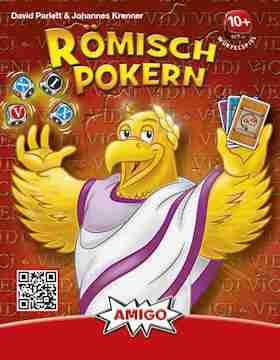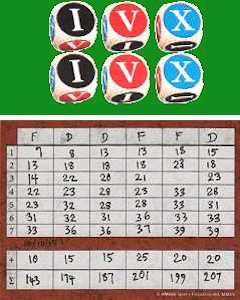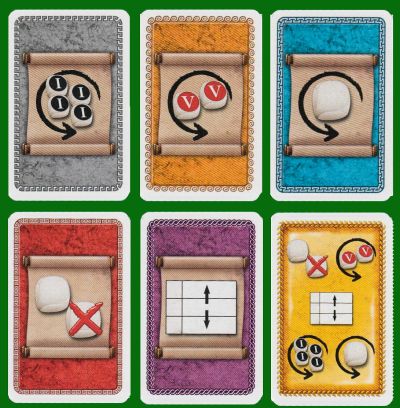
Alea Romana is all that remains of a Roman chariot race game called Right Round Rome, which half a dozen manufacturers liked enough to play-test extensively before deciding that it was too complicated. So I ditched the board and concentrated on devising games of skill to play with the dice alone. Johannes Krenner, of White Castle Games, added some Joker cards to turn it into a longer and more exciting game for two to six players. It was the publisher Amigo's idea to call it Roman Poker, which I wouldn't have done as it bears no relation to Poker at all. But I'm very pleased with the design and artwork they produced. It first appeared in August 2015.
Equipment
 6 dice, each bearing these Roman numerals: I I I V X X (above right)
6 dice, each bearing these Roman numerals: I I I V X X (above right)
1 scorepad. Each sheet has 6 columns,
one for each player if six play, or enough for two games for three players or three for two (below right).
6 "Help!" cards (as explained below).
Object
To score points for making a valid Roman number by rolling the dice one at a time at each turn, and to enter these scores in your scoring column in numerical order. The winner is whoever finishes with the highest total after seven turns.
Set-up
Give each player 6 help cards. Decide who goes first, appoint a scorekeeper, and write the name or initials of each player in order at the head of the columns of the scoresheet.
Play
At each turn you roll dice one at a time until either (a) you are satisfied with the total they produce, or (b) you bust by making an invalid number. An invalid number is one containing two Vs, or four Is, or four Xs (except for XXXIX = 39, the highest possible total).
If you stop with a valid number, you enter it into any of the seven spaces of your scoring column. In deciding which space to enter it into, remember that any higher number you may make will be entered below it, and any lower number above it. If there is no valid space for the number you make it counts as a bad throw and can't be scored unless you successfully play one of your help cards.
If you make a bad number, by rolling a second V or a fourth I or X (unless XXXIX), your turn ends unless you escape by successfully playing one of your help cards.
Help cards
 You have six help cards, and may use any one of them to help a bad throw, whether it makes an invalid
Roman number, or because the number it makes can't be legally entered in your score column.
You have six help cards, and may use any one of them to help a bad throw, whether it makes an invalid
Roman number, or because the number it makes can't be legally entered in your score column.
The help cards are:
1. You may re-roll any number of dice showing I.
2. You may re-roll any number of dice showing V.
3. You may re-roll any single die.
4. You may set aside any number of rolled dice and ignore them from the count
and may (if you wish) roll any number of the dice you didn't roll.
5. You may enter a score you have already made, provided that there is an empty space either
immediately above or immediately below the existing entry.
6. Joker: You may do any one of the above.
You may use each help card once only and must turn it face down once used. Unused help cards each add 5 points to your final score. Note: If you make an invalid or unusable number you're not obliged to use a help card to get out of it. You may, if you prefer, simply leave a blank space in your score column (as did F in round 3 of the third game illustrated above).
Ending and scoring
The game ends at the end of a complete round of play in which one player has entered their seventh and last score. Anybody with one or more unused help cards enters a total of 5 points for each such card in the row marked (+) and the figures in each column are totalled (∑). Whoever scores highest wins.
Follow the link for more games to play with Alea Romana
